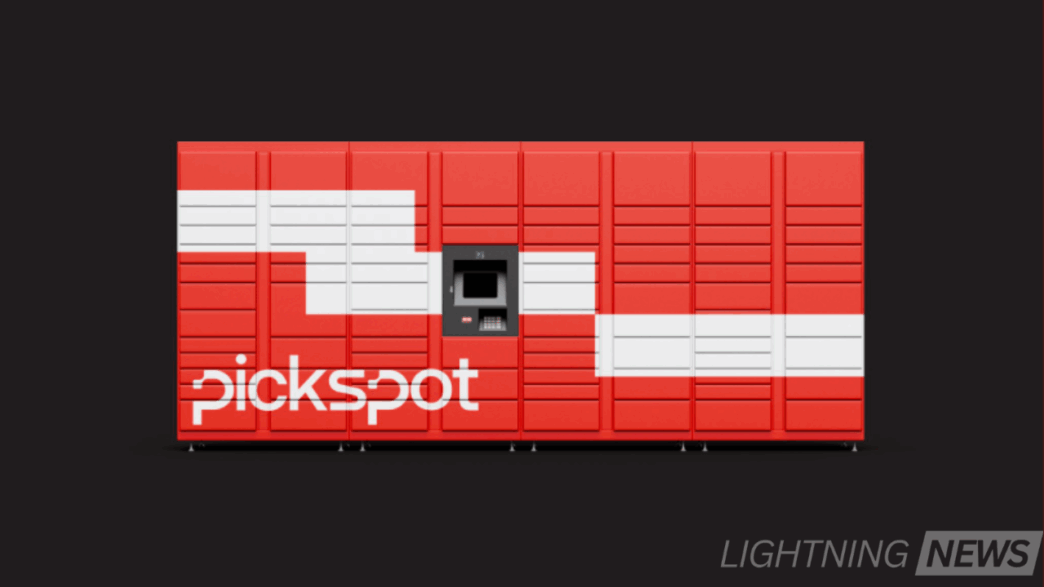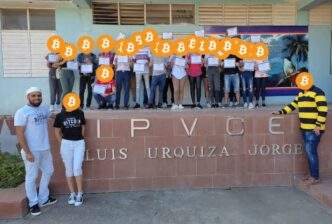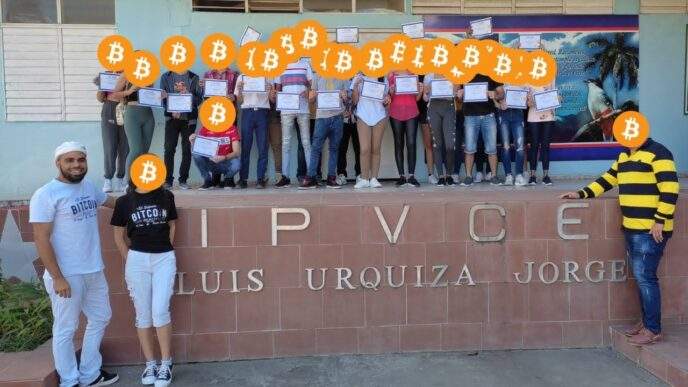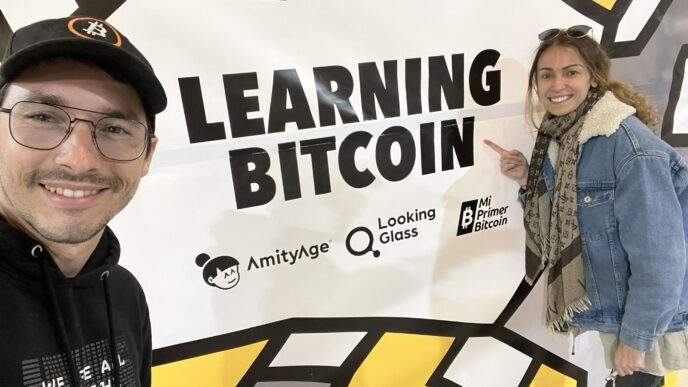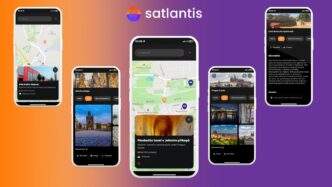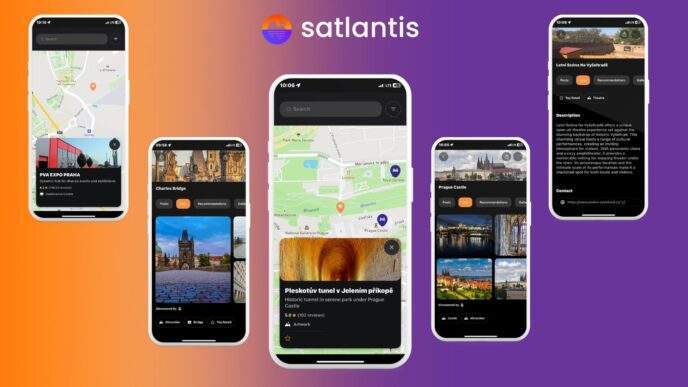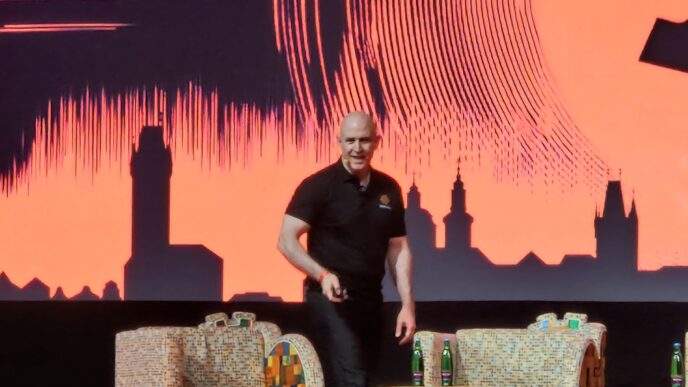An entire continent economically ghosted, not by conflict, or corruption, or lack of ambition – but by the silent tyranny of the blank space where an address should be. Keynan Warsame felt this invisibility snap into focus the moment he moved back to Kenya. Pickspot is the audacious answer.
This isn’t just about lost parcels. It’s about an entire hemisphere locked out of the digital economy’s core promise. It’s proof-of-pain measured in covert parking lot meetups and logistics costs that defy gravity. Warsame saw the chasm: a digital future built on sand, while half the world lacked the first, fundamental brick – a place to be.
So, he decided to mint it.
Not with bureaucracy, but with bitcoin. Not with paper maps, but with programmable lockers. Not just for parcels, but for people claiming their digital selves. This is more than logistics. This is laying the neural network for Africa’s digital sovereignty.
Eureka Moment
- What personal experience or insight sparked the idea for Pickspot? Was there a “lightbulb moment” that made you realize Africa needed a digital addressing revolution?
After growing up between Kenya and Europe, I saw firsthand the invisible power of a simple thing: an address. In Europe, having an address meant being part of the digital economy. Packages arrived. Services worked. Identity was recognized.
But when I moved back to Kenya, that infrastructure disappeared overnight. That luxury was gone.
Then I realized it wasn’t just me. Over 4 billion people globally, and more than 80 percent of Africans, don’t have a functional address. This wasn’t just a local inconvenience. It was a global infrastructure gap. And if we didn’t solve it, we would be building the digital economy on sand.
That’s when we decided to fix it. Starting with Africa.
- From concept to launch, what were the pivotal milestones that shaped Pickspot?
We went through a lot to get here. At first, we were deep in the DePIN space, focused on machines and lockers. But we eventually realized the core issue wasn’t the hardware—it was the human layer. We weren’t just addressing parcels or places. We were meant to address people.
That insight changed everything.
Now, after years of iteration, we’re launching the Pickspot app. It allows anyone in Africa to claim a digital handle and vote for locker locations and earn spot points for our Airdrop. That’s our beginning.
- Beyond unreliable addresses, what systemic challenges in African logistics and e-commerce does Picksspot aim to solve?
Systemic Challenges– Everything in logistics depends on one thing: an address.
Without it: Shipping to Africa becomes the most expensive in the world. Last-mile delivery fails more often than it succeeds. E-commerce cannot scale, Fintech solutions collapse at the point of physical fulfillment.
If you can send money digitally but cannot receive physical goods, what’s the point? It’s like being online with no way to connect to the real world. You might as well walk to a shop.
- How did you confirm this was a critical need? Share a story where the lack of addresses directly impacted someone’s life or business.
People go through covert ops just to receive a package. They call multiple riders, meet strangers in parking lots, and hope the item shows up. That isn’t e-commerce. That’s chaos.
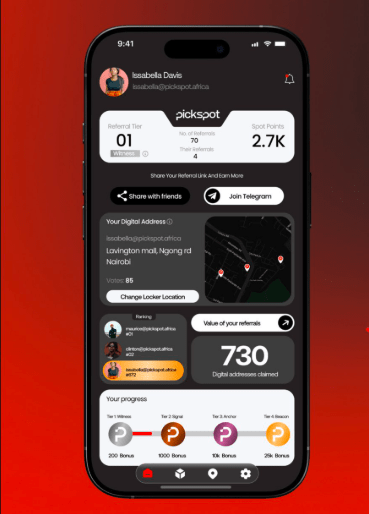
The Pickspot Solution
- Walk us through how a first-time user interacts with Pickspot—from app sign-up to retrieving a package via smart locker.
Users download the Pickspot app and claim a unique digital handle, like amina.pickspot.africa. That becomes their delivery address.
When they shop online, they input their handle. The system resolves it to their preferred locker. Any parcel sent to that handle is automatically routed to that locker.
It’s email for packages. It’s an identity for logistics.
- How does leveraging bitcoin and peaq enhance security, transparency, or scalability compared to traditional systems?
We wanted transparency. We wanted verifiable proof of how the network performs. That’s why we built PST, a token that is only minted when real work occurs.
Real work includes:
Digitally: address creation, referrals, and locker votes
Physically: locker doors opening or closing during delivery
Our machines report directly to the blockchain. With Peaq, we verified machine actions. With bitcoin, we anchored the economic value behind it.
Pickspot combines modular Web3 tools to bridge the physical and digital.
We use Peaq to verify locker activity, and Celo for fast, mobile-first stablecoin payments across Africa. Our Satoshi Medallions—Bitcoin-backed Taproot Assets—are minted directly on Lightning, linking us to Bitcoin’s most scalable layer.
Together, this stack makes Pickspot transparent, affordable, and ready for mass adoption.
- Who are your first users, and how are you tailoring solutions for informal businesses vs. everyday consumers?
Our early adopters include:
- Students
- Informal businesses
- Urban shoppers using online platforms
We’re starting digitally to map demand. Locker deployment will follow, based on data—not guesswork.
- How do you plan to scale across Africa’s diverse markets, each with unique infrastructural and cultural nuances?
Lockers are placed where people already go: gas stations, malls, supermarkets. That’s how we scale—one digital address at a time, anchored by real-world access points.
- Beyond blockchain, what makes Pickspot’s model hard to replicate? Is it partnerships, proprietary tech, or community trust?
What Makes Pickspot Hard to Copy
It’s a social network of addresses. Every new user increases the system’s value
Our locker network is open-access. Anyone can send to or from our lockers
We’ve built APIs for both SMEs and large logistics platforms to plug into
Most players want to own everything. We just want to build the rails—and let everyone use them.
- Do you charge per transaction, subscription, or through partnerships (e.g., logistics companies)?
Revenue Streams:
Flat service fees on parcel delivery to lockers
Satoshi Medallion sales—bitcoin-backed digital collectibles that fund the network and unlock token rewards for holders.
API access for third-party logistics companies
PickSend Business Subscriptions – A white-label suite of tools that lets merchants create digital storefronts, issue custom delivery addresses, and offer locker-based fulfillment. Businesses can use it for their own operations or scale it into a full marketplace by onboarding multiple vendors under one branded platform.
Bitcoin Treasury Model
Pickspot isn’t just a logistics protocol. It is also a bitcoin treasury company.
A fixed percentage of all Satoshi Medallion sales goes to our BTC reserves, split into three parts:
- A protocol reserve that backs medallions
- A company treasury that anchors the equity value
- A hashpower fund used to acquire bitcoin mining capacity
Hashpower-Backed Token (PST)
Pickspot’s native token, PST (Parcel Settlement Token), is only minted when real logistics work occurs—whether through digital actions (like address creation, referrals, or locker voting) or physical events (like verified parcel drop-offs or pickups). This creates a proof-of-growth issuance model rooted in network activity.
To manage supply and maintain economic integrity, we’ve introduced a unique burn mechanism tied to bitcoin mining:
Any bitcoin revenue generated from the hashpower we control is used to buy PST on the open market and burn it.
This means that the more bitcoin we mine through the network’s allocated hashpower, the more PST we remove from circulation—linking the token’s deflationary pressure directly to real-world energy expenditure and bitcoin economics. It’s a model where infrastructure, tokenomics, and sustainability converge.
What We Don’t Do
Pickspot does not run a rider fleet. We do not compete with logistics companies. Instead, we empower them.
Riders from platforms like Bolt, Uber, or local dispatch services can use our lockers. We build the rails—addresses and lockers.
Affordability by Design
Pickspot is a DePIN protocol built on decentralized infrastructure and funded by tokenized asset sales. That allows us to keep costs low and scale without centralized overhead.
The result: affordable infrastructure for the everyday African consumer.
- Have governments or legacy systems resisted your model? How did you navigate this?
Regulatory Landscape
We haven’t hit many regulatory hurdles—mainly because there’s no precedent. But we’ve structured the project carefully. The protocol and the company are separate. And we engage with regulators early.
User Education
If you use Pickspot, you’d never know it’s a Web3 app. It feels like any other app—social login, clean UI, no crypto noise.
The only Web3 feature is the airdrop. Users earn Spot Points, which convert into PST later.
That’s how we onboard the future—by hiding the complexity.
What’s Next?
- What’s next—new features, geographies, or partnerships?
2025 Launch
We’re starting in Eastleigh, Nairobi—one of the city’s most densely populated,vibrant commercial and residential zones
Then we expand:
Nairobi-wide
Digital-only rollouts across Africa
Locker rollouts based on actual user demand.
- Could Pickspot evolve beyond logistics (e.g., digital identity, financial services)?
Eventually, a digital address won’t even be called digital. It will just be your address. Like a phone number—personal, portable, and permanent. - How does Pickspot contribute to UN goals like poverty reduction or economic growth?
UN SDGs
Pickspot contributes to:
- Goal 1: No Poverty—by unlocking E-commerce for SME’s and entrepreneurs
- Goal 9: Infrastructure—by creating open logistics rails
Goal 11: Smart Cities—by using lockers as shared logistics hubs
- How will Pickspot reshape Africa’s digital and physical infrastructure in 10 years?
If we succeed, we won’t just improve deliveries. We will have built the foundational layer of Africa’s digital economy—for logistics, for payments, and for identity.
- How do you attract talent passionate about both tech and African development?
We hire young, driven people who believe in infrastructure, access, and the future of emerging markets.
- What values drive your team—resilience, innovation, community?
Culture Code:
- Build for impact
- Prioritize inclusion
- Stay modular
- Don’t copy. Innovate
- Think in decades
Lightning Round
- One piece of advice for aspiring African tech entrepreneurs?
Founder’s Mantra
If you’re building in Africa or any emerging market and not building for stablecoins, decentralization, and bitcoin—you’re already behind.
Unsung Hero
We have a brilliant team all around that we are very thankful for but let me say our CTO Brian Ng’ang’a. Quiet but relentless. Without him, none of this would be possible.
Favorite Feature:
The app. For the first time, people who’ve never had an address can finally own one—with their name on it. Something personal. Something permanent.
- How can readers support Pickspot’s mission?
Follow us. Spread the word. Download the app when we launch end of this month . If you live in Africa, claim your digital address. You probably don’t have one yet.
Final Pitch
You can’t unlock e-commerce without infrastructure. And you can’t build infrastructure without solving the address problem first. Pickspot is that solution.


